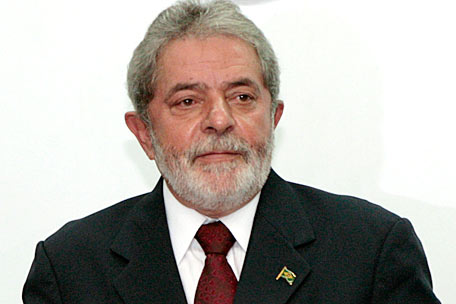Brasil lidera Movimento para Criar Regime Global da Internet
January 3, 2011
Luiz Inácio da Silva, é o “peão” dos globalistas para censurar a Internet.
Por Luis R. Miranda
The Real Agenda
Janeiro 3, 2010
As Nações Unidas e alguns de seus estados mais opressivos estão pedindo a regulação global da Internet, incluindo a censura. Para esse fim, a ONU está trabalhando para estabelecer um “grupo de trabalho intergovernamental” para encontrar maneiras de controlar melhor a rede mundial de computadores e para “harmonizar” as políticas de conteúdo da Internet.

Dirigido pela delegação brasileira, chefiada pelo “antigo” marxista revolucionário Luiz Inácio “Lula” da Silva, a ONU está defendendo um novo regime de Internet e os membros que apoiam este plano inclui alguns dos governos mais despóticos da terra. Entre eles: China comunista e as ditaduras islâmicas da Arábia Saudita e Irã. Outros países que apóiam a idéia são a Índia ea África do Sul.
National Public Radio citou alguns funcionários do governo empurrando a ideia. “Os governos estão no meio desse processo”, disse o representante do Ministério chinês da Indústria da Informação, Tang Zicai. “Esse processo não pode avançar sem a participação significativa dos governos.” O regime comunista da China é conhecido por, entre outras coisas, a censura da Internet, a repressão brutal da dissidência, e até mesmo abortos forçados.
O regime islâmico iraniano, que também é conhecido por esmagar a oposição política, apoiou o movimento das Nações Unidas. “O progresso não apoiou o crescimento dos países em desenvolvimento em questões relacionadas à política de Internet”, disse o representante da ditadura, Mohammed Hussain Nejad. “Os países desenvolvidos monopolizam a formulação de políticas sobre questões como tratados mutuamente exclusivos, enquanto marginalizam ainda mais os outros países, principalmente os em desenvolvimento.”
A ditadura islâmica que governa o país norte Africano da Mauritânia, que tomou o poder após a interrupção do governo despótico anterior, também expressou esperanças para a censura na Internet em todo o mundo. Durante as conversações da ONU em Nova York, os tiranos da Mauritânia sugeriram que “a política internacional no ambiente da Internet deve incentivar cada país para assegurar o controle de conteúdos na Internet.” O propósito da censura de seu mandato como o representante do regime, seria para evitar o aparecimento de conteúdos na Internet “não autorizados pelas leis da moralidade” no território de qualquer outro governo. Em outras palavras, se o governo da Mauritânia pensa que qualquer conteúdo não é moral, este seria proibido de acessar em outros países.

Global esforços de regulação têm o apoio de uma resolução adoptada pelo Conselho Económico e Social, que se destinava a “pedir consultas abertas e inclusivas envolvendo todos os Estados-Membros e demais partes interessadas para ajudar no processo de cooperação reforçada para permitir aos governos em igualdade de condições realizar seus deveres e responsabilidades no que diz respeito às questões de política pública relacionados com a Internet … “
O Fórum de Internet da ONU vai expirar em breve, e a corrida para manter e construir o que foi alcançado em termos de controle da Internet já coemcou. Até agora, a Comissão de Ciência e Tecnologia para o Desenvolvimento do plano da ONU planeja a próxima fase do plano de governo. E desta vez, este plano inclui somente os governos.
Houve alguns protestos de pequena parte de alguns governos e grupos industriais. Mas a maioria das reclamações são sobre o processo, não sobre a censura e regulação.
“O pior cenário seria a instituição de formas de controle das Nações Unidas na Internet”, disse o coordenador de Política Internacional de Comunicações e Informação do Departamento de Estado os EUA, Philip Verveer. “Inevitavelmente, a lentidão vai trazer enormes problemas em termos de tomar decisões críticas, não seria possível tomar decisões entre as nações porque tomariam muito tempo. O processo de definição da arquitectura da Internet, a adoção de tecnologias ou de acordos comerciais ao redor do local seria muito lenta. “
Verveer, a seu crédito, manifestou alguma preocupação com a censura. “[Estes governos] não gostam da idéia de livre fluxo de informações e o controle governamental seria uma forma de controlar o conteúdo que passa através da Internet, pedindo um tratado e outras administrações para cooperar em termos da remoção do conteúdo que não se entende como moral”, disse ele. Mas para a maioria, o processo de regulamentação e de exclusão foram identificados como problemas, e não o começo da supressão da expressão.
O governo da Austrália também expressou sua oposição, apesar de não abordar especificamente a vontade de ditaduras e das Nações Unidas para censurar a web. “Minha preocupação é que, se fôssemos fazer um movimento para formar um órgão do governo, enviamos uma mensagem a sociedade civil que a sua valiosa contribuição não é necessária ou não esta sendo procurada”, disse ele na reunião das Nações Unidas em Nova Iorque. Vários outros governos expressaram preocupação sobre o processo.
“A beleza da Internet está em que não é controlada por um único grupo”, escreveu a gigante da web, Google, em seu blog. “Sua estrutura é de baixo para cima – com os acadêmicos, organizações sem fins lucrativos, empresas e governos que trabalham para melhorar a maravilha tecnológica do mundo moderno. Este modelo fez a internet muito aberta – é um campo de testes para a inovação por qualquer pessoa, em qualquer lugar – o que também impediu a interesses especiais assumir o controle “.
Muitos outros grupos publicaram uma carta conjunta condenando o movimento, incluindo o Conselho de Controle da Internet, Internet Society, a Câmara de Comércio Internacional, e muitos mais, o Google anunciou que estava apoiando uma petição para parar o ONU e os seus companheiros. “Nós não acreditamos que os governos deveriam ter um monopólio na internet. O financiamento actualmente em vigor e trabalha protegem os usuários dos interesses existentes e permitem uma rápida inovação. Nós vamos lutar para mantê-lo dessa maneira. “
Naturalmente, o Google está trabalhando em separado com o governo dos EUA para efetivamente assumir o controle total da web.
As revelações de Wikileaks são uma das razões citadas para justificar as ambições de regulamentação, e as revelações foram especificamente mencionadas pelo governo brasileiro, que está encabeçando o movimento para a censura. Mas enquanto alguns elementos do governo dos EUA oferecem uma sentença leve do sistema proposto, o Departamento de “Homeland Security” apreendeu sites pelo que chamaram “violações de direitos autorais” sem nenhuma prova, e sem ter processado os alegados autores desses crimes nos tribunais. Enquanto isso, a Comissão Federal de Comunicações está trabalhando febrilmente sobre a aprovação e aplicação de normas inconstitucionais que penalizam Internet – tradicionalmente livre e aberta – sem sequer obter a aprovação do Congresso.
Mas os comentaristas conservadores nos EUA estão correndo para entrar no ringue. “A ONU está respondendo às preocupações dos governos dos países membros, incluindo os Estados Unidos, a internet permitiu a criação de empresas como WikiLeaks, enquanto que a FCC está mais preocupada com mídia conservadora na Internet que minam as tentativas do governo para controlar a notícia através de sua mídia corporativa”, escreveu o jornalista e escritor Jerome Corsi. “O que está em jogo é o futuro dos direitos electrónicos e a liberdade de expressão. Governos de todo o mundo percebem que eles têm menos controle sobre a mídia alternativa e críticas podem operar livremente na internet. “Ele concluiu explicando que” as Nações Unidas estão preocupadas com a Internet que porque não podem controla-la. “
Legisladores nos Estados Unidos também reagiram com indignação à tentativa de aquisição das Nações Unidas. Representante Mary Bono Mack, apresentou uma resolução que condena os esforços da ONU. “[A] Internet progrediu e prosperou precisamente porque não foi submetida à mão pesada e sufocante de uma organização governamental. As Nações Unidas tentam controlar algo tão fundamental para nossa economia – como a Internet – é ofensivo e totalmente fora de lugar “, disse ele na introdução do projeto. “É dificil o suficiente tentar controlar a Comissão Federal de Comunicações e de suas iniciativas na internet, imagine ter de convencer os governos, como Síria, Irã e Venezuela … Apelo ao Presidente e seu governo se opor a qualquer tentativa de transferir o controle da Internet para os Estados Unidos, as Nações Unidas ou de outras entidades internacionais governamentais. “
Os tiranos de todas as variedades percebem que uma Internet livre é uma ameaça ao seu controle, por isso não é necessariamente surpreendente que direcionem esforços para regular e censurar. O que é ainda mais alarmante, porém, é a falta de protesto sério no “mundo livre” – que até agora está trabalhando em seus próprios sistemas a nível nacional e internacional para pôr fim ao que poderia ser a última esperança da liberdade de expressão sem censura em todo o mundo.
Para que a liberdade sobreviva e se expanda no mundo, as pessoas devem opor os planos dos tiranos e seus parceiros internacionais para continuar com esse pesadelo.

